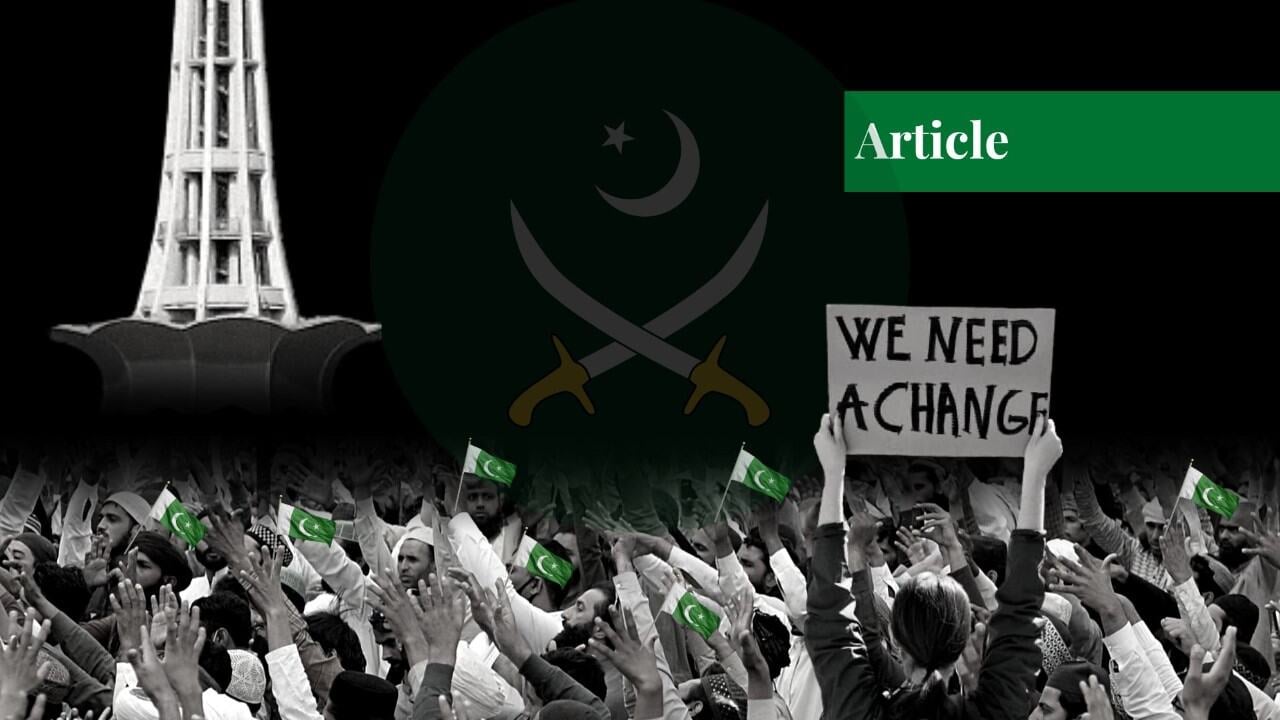Ms Hina Anwar is a journalist with a long line of experience in research and media.
Introduction
Five factors—political stability, economic prosperity, a powerful military, a firmly established civil order, and the absence of severe weather hazards—are essential for a state to be secure and stable. Presently, Pakistan is lacking in all five elements necessary for state stability.
Pakistan is suffering from a crippled economy and has not yet recovered from a humanitarian crisis that was made worse by climate change-related extreme weather events. To make matters worse, a power struggle among the political elites has dangerously polarized the nation and sent it into disarray. This deadlock was made worse by the speculation surrounding the Army Chief’s appointment.
In contrast to Pakistan, the rest of the world continues to treat the appointment of the COAS as a mundane matter. In Pakistan, the Chief of Army Staff’s appointment dominated politics and talk shows for weeks, sparking nonstop speculation on social media. 24th November ended up being the date that eventually provided some stability to Pakistan’s most volatile political power struggle.
In any case, the political breakthrough that has resulted from everyone accepting the appointment of the new COAS of Pakistan has been welcomed, in the hope that things will now be able to move in a positive direction. Will the change in command at GHQ let go of the past and usher in a new era of civil-military relations? Let’s take a look back at what history has to say before we are overcome by the fever of idealism.
Past Appointments
In Pakistan, it is believed that the COAS will act as the nation’s top law enforcement officer, diplomat, or even economist as part of his constitutionally mandated duties. Politicians feel it is necessary to have a pliable Army Chief, so they play about with surprise appointments and extensions that are made out of turn. This, however, is usually not the case because every Chief appointed (or given an extension) has mostly always proven to be a man in uniform motivated by institutional values and principles.
However, the urge and desire to choose one’s ‘own man’ always persists. With a few exceptions, all of these appointments were a complete 180 degrees from their selfish intentions and expectations.
The first coup’s mastermind, General Ayub, believed that General Musa would not pose a danger to his rule, so he promoted himself to the position of President and named General Musa as the Commander-in-Chief of the Pakistan Army (later changed to Chief of Army Staff or COAS). Naturally, Ayub was an army man, and throughout his ten-year tenure, the army became very involved in domestic and international politics.
General Zia’s death in a plane crash in August 1988 led to General Aslam Beg’s appointment as COAS. Nawaz Sharif, who had appointed Musharraf as his COAS, was expelled in 1999. Ashfaq Kayani, Musharraf’s choice for COAS, moved for Musharraf’s exit at the coalition government’s request.
The Commotion Around the Appointment
Primarily due to political reasons (and an alleged foreign conspiracy), Khan was removed from office through a no-confidence vote in April. During his rallies (after his removal) Khan kept criticizing specific individuals from the armed forces and created quite a controversy around the new Chief’s appointment. Khan also claimed that the Sharif family would pick a ‘pliable’ COAS who would work towards ending Imran’s political career and purportedly protect the Sharif family’s ill-gotten fortune.
The PM has the discretionary authority to name the COAS, but this time, in a touch of irony, the final decision-maker was a man who is ineligible to sign the appointment papers and does not even reside in Pakistan: former PM Nawaz Sharif, the current PM’s elder brother who lives in self-exile in England and holds numerous political records. In addition to having been elected PM three times (1990, 1997, and 2013), he has also been ousted from office in the middle of each of those terms. There are also countless allegations of corruption against him and his family.
Moreover, Nawaz Sharif appointed five Army Chiefs during all his tenures. However, the ties have nearly always soured with either the appointees or with the army itself. During the second week of November, Nawaz Sharif called the current PM, his younger brother Shahbaz Sharif, to London, where for days the political unrest in the country and the profiles of the major contenders for COAS were discussed.
Higher Political Stakes
Lieutenant General Asim Munir was scheduled to retire on 27th November, but the government was still able to assure his eligibility as a contender for the COAS’s position thanks to Rule 16A of the Pakistan Army Act of 1952. However, for that, the seniority list had to be delivered to the defense ministry, and a summary had to be delivered to the PM days before November 27.
After careful consideration and consultation with numerous people both inside and outside the PML-N, Nawaz Sharif allegedly decided on the new COAS. Reportedly, Imran Khan attempted to enlist President Arif Alvi’s assistance to block the new appointment. However, in the end, the President allegedly adopted a more cautious approach and counseled Khan not to alienate the new COAS.
Between the 2016 & 2022 Appointments, What has Changed?
The former COAS was chosen to take over after Raheel Sharif resigned in 2016. While the military and Nawaz Sharif’s government both professed to be “on the same page” and were allegedly trying to support institutional harmony and the constitution, rumors and fears of a military takeover lingered during the (now former) COAS’s tenure.
Six years later, with only a few small adjustments here and there, Asim Munir is being greeted with the same set of issues. For better or worse, the political and military elites are still engaged in a struggle for increased authority, just as they were at the time of his predecessor’s appointment. The army is once again dealing with terrorism, while relations with India (and Afghanistan) get worse.
The path in front of the new COAS is rough. A plethora of obstacles stand in his way and raise many questions; will he concentrate on delivering in his area of responsibility, or engage in conflict over issues outside of it? Will he be able to implement the recommendations made by his predecessor to strengthen political institutions and advance democracy?
The Direction of the Political Unrest
The former COAS stepped down after asserting that he had effectively sent the military back to its barracks to prevent more political misadventures. However, given the issues with history and legacies, that is easier said than done. Due to the prolonged political gridlock and economic instability, it is unclear where the new COAS will take the army’s political wing.
Imran Khan is still protesting for elections to take place since he does not believe the PDM government is in power due to the ‘will of the people’. Khan may still get his wish – partially due to the support he receives from his fervent popular supporters, and partially to the disappointing performance of the PDM administration, which was tasked with enacting challenging economic policies to prevent bankruptcy.
The announcement that he intends to dissolve the provincial governments that the PTI controls is his most recent move on the political chessboard. He did this in the hope of compelling the federal government to finally schedule general elections.
It seems that the PDM administration will maintain its position and leave Imran Khan no room to maneuver. Alongside the cases against other PTI leaders, Khan’s ‘toshakhana‘ or alleged foreign funding case is likely to be enhanced and moved forward. Imran Khan will likely cause a stir and attempt to reactivate the judicial system and establishment. The poor economy will sputter and sway in the meantime amid the turbulent political climate.
Political and economic stability are important prerequisites for Pakistan’s capacity to receive much of the bilateral and international financial aid promised to it. There won’t be any relief because Imran Khan’s plan is likely to create chaos. Every day would bring news of some economic hardship or scarcity, allowing Khan to pressurize the government.
The PDM is hoping to hold on to power until late next year. Imran Khan is making a terrible effort to avert this. Also anticipated to return to Pakistan and take center stage is Nawaz Sharif who will likely push the PDM administration to punish Imran Khan for his actions while attempting to overturn the convictions and disqualifications levied against him.
The bruised and battered judiciary of Pakistan may look to the new COAS for guidance, and if it receives none, it will have to prove its worth by making the necessary U-turns to create an open and level playing field for all parties.
Without a deliberate and concerted effort from key players in the military, judiciary, political parties, and civil society under their statutorily defined tasks, the severe wounds inflicted on all facets of the state and society can not be fixed. Pakistan’s progress over the next six months will demonstrate whether or not it is on the right track.
Conclusion
The new COAS has taken over a deeply fractured civil society, as well as a seemingly discredited and divided military command. The current crisis has demonstrated the Pakistan Army’s resilience in a way that surprised many. In the future, a lot will depend on whether politicians are truly interested in a democratic process or just a power struggle. There is no reason to anticipate that the army command will stay out of politics if the politicians continue to prioritize the courts, roads, and GHQ over the parliament.
If you want to submit your articles and/or research papers, please check the Submissions page.
The views and opinions expressed in this article/paper are the author’s own and do not necessarily reflect the editorial position of Paradigm Shift.



















